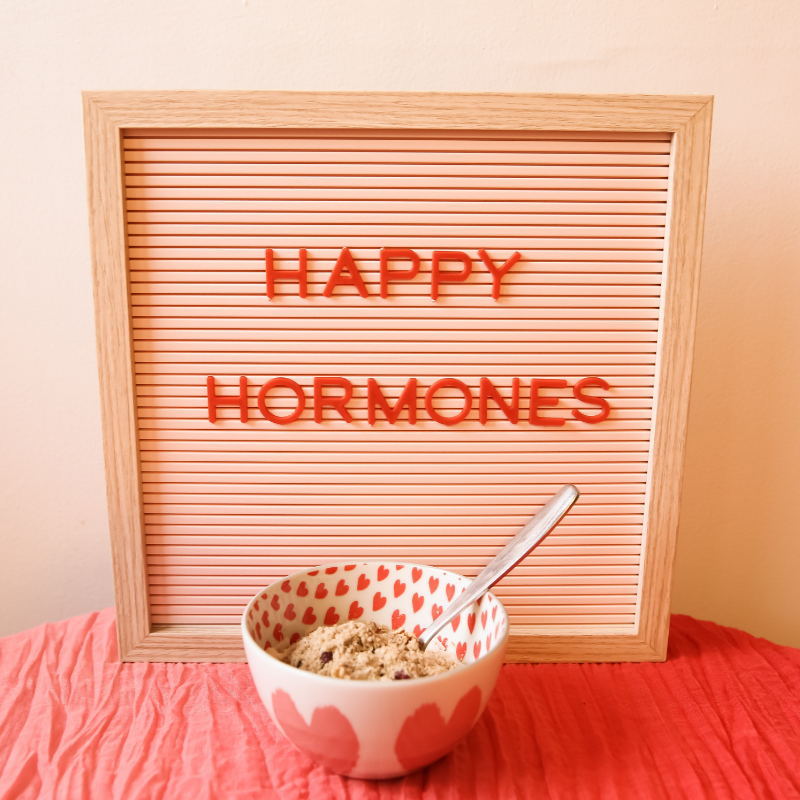June 7th, 2021
Nutrition and lifestyle tips to balance hormones

Balancing Hormones
Hormones can be TRICKY to understand! Whether you are getting off of birth control after many years or are just entering a different stage of life, it is worth taking a look at your hormones.
What are hormones anyways? Hormones are chemical messengers in the body that are critical for your overall health. In conventional medicine, hormone imbalances are often addressed through various medications and synthetic hormone replacements. While this can be effective, there are other more holistic ways to approach hormone imbalance. In this post, we will be talking about the relationship between foods and supplements on hormones, as well as lifestyle changes that can positively impact your hormones.
Relationship between food and hormones
Your hormones are influenced by the foods you consume. For example, the body actually needs fat to synthesize hormones, so incorporating healthy fats in your diet essential. Not just any fats, though; we recommend focusing on anti-inflammatory fats that are full of omega-3’s – we will list these foods later on.
In addition to fat, your hormones and blood sugar have a symbiotic relationship. Cortisol and Insulin are both hormones that are influenced by blood sugar. Cortisol is released in response to acute stress and causes glucose to be released into the bloodstream. Elevated cortisol levels over time result in consistently high blood glucose. Insulin is released in response to high blood sugar in an effort to get glucose out of the blood and into the cells. In summary, managing your blood sugar is an important factor in balancing your hormones.
Tips for managing blood sugar and hormones:
- Eat every 3-4 hours (helps with blood sugar and insulin levels)
- Focus on eating healthy fats with every meal
- Eat balanced meals (hint: this means incorporating protein, fat, and fiber in meals)
- Decrease refined carbohydrates and added sugars (think: processed foods, pasta, and bread products)
- Limit caffeine and alcohol (impacts cortisol and insulin)
- Hydrate! (dehydration can elevate cortisol levels)
Some of our favorite foods to balance blood sugar and hormones:
- Eggs (a great balance of protein, fat, and carbs plus full of nutrients)
- Avocado (high in omega-3s)
- EVOO (high in omega-3s)
- Hemp Seeds, Chia Seeds, Flax Seeds (high in omega-3s)
- Wild-caught salmon, grass-fed meats, pasture-raised eggs
- Walnuts high in omega-3s
- Root vegetables like sweet potatoes, squash, turnips
Sample day of eating:
Breakfast: Smoothie with spinach, banana and berries, chia seeds, protein powder, water or nut milk.
Snack: 2 tbsp of nut butter with celery/carrots and a few Ella’s flats crackers
Lunch: Arugula salad with chickpeas, hemp seeds, peppers, cucumber, onion, and hummus drizzled with extra virgin olive oil, lemon, salt & pepper
Snack (or dessert): Raspberries with dark chocolate
Dinner: Baked salmon on a bed of sauteed spinach with sweet potato
Supplements and herbs to balance hormones
While food is the primary tool to aid in balancing hormones, supplements/herbs can be a great addition. The supplements/herbs we recommend will often vary on a case-by-case basis and depend on which hormones are out of whack.
Some of our favorite supplements/herbs to balance hormones:
- Adaptogens – promote hormone balance and reduce stress (ashwagandha, medicinal mushrooms, holy basil, etc.)
- Maca
- Evening primrose oil
- Chasteberry
- Vitamins and Minerals (Magnesium, Vitamin D, B vitamins)
Ways to balance hormones and blood sugar (aside from diet)
Aside from diet, there are impactful lifestyle changes one can make to help balance hormones. Remember that lifestyle affects many aspects of one’s life, including both diet and stress levels impacting hormones.
3 lifestyle tips for balancing hormones (and blood sugar):
- Engage in regular exercise (in this case, lighter exercise is better than more intense exercise, which can stress out the body)
- Get quality sleep
- Reduce stress (engage in mindful practices daily like journaling, yoga, or meditation)
Bottom Line
Your hormones are complicated, but balancing them does not have to be all that tricky. The key is balancing blood sugar and eating a nutrient-dense diet alongside living a healthy lifestyle. Hormonal imbalances can be detected by analyzing one’s signs and symptoms. In some cases, hormone testing will be done to get a closer look at what is going on.
Feeling off and thinking your hormones are to blame? Click here to work with us!



